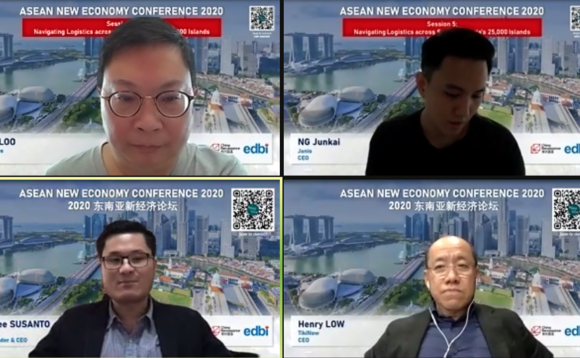
Tech, flexibility indispensable in ASEAN logistics

Logistics operators navigating Southeast Asia’s challenging fragmentation against the backdrop of COVID-19 must embrace digital upgrades and flexibility in terms of service offering.
"I don't think it's a privilege or a choice. You either digitize or you become a white elephant. Even in the small SMEs [small to medium-sized enterprises], you can't be an island," Henry Low, CEO of TikiNow Smart Logistics, a last-mile operator controlled by Vietnam e-commerce platform Tiki, told the ASEAN New Economy Conference.
"For us, it's very important that we're able to API [application programming interface] connect with big players or small mom and pops. We must be able to connect with them and they must be able to connect with us."
Tiki has received almost $200 million from the likes of Northstar Group and EDBI, the latter of which co-hosted the online conference. Low concurred with a number of regional logistics players at the event on the need to launch new services in response to changes in customer behavior during the pandemic, including a strong shift toward food delivery.
Paul Loo, COO of Hong Kong's Lalamove, described 2020 as a rollercoaster year for his company, which operates in both consumer and B2B capacities across 21 markets in Asia and Latin America. He noted that while demand for grocery delivery had spiked during the lockdown, activity by other SMEs has bounced back quickly with the lifting of restrictions.
"We must be diversified because during this time, you have markets going up and down and putting all your eggs in one basket becomes very dangerous," Loo said. "When it comes to the different verticals, if you're over-relying on just one or a small number, it's very dangerous."
Lalamove, also knowns as Huolala in mainland China, has raised $1.6 billion to date following a $300 million in Series D round last year that featured Hillhouse Capital and Sequoia Capital China. That round was primarily intended to support a Southeast Asia expansion. At the time, Lalamove estimated the region's logistics space was worth $160 billion.
Junkai Ng, co-founder of Singapore cross-border logistics start-up Janio, emphasized the need for local partnerships when trying to access Southeast Asia's 25,000 islands at a time when air freight is disrupted and consumer expectations become increasingly sophisticated. Janio, which is active in 12 Asian countries, received backing from Sequoia Capital, Insignia Venture Partners, and Febe Ventures earlier this year.
"Why must everything be routed through Jakarta. If you have volumes going to the east of Indonesia, why can't you route it through Denpasar or Medan instead.," sadi Junkai Ng, co-founder of Janio. "Creating more entry points into the country effectively reduces your supply chain length. As your supply chain gets shorter and your costs go down, your speed doubles. It's the same concept in the Philippines."
Latest News
Asian GPs slow implementation of ESG policies - survey
Asia-based private equity firms are assigning more dedicated resources to environment, social, and governance (ESG) programmes, but policy changes have slowed in the past 12 months, in part due to concerns raised internally and by LPs, according to a...
Singapore fintech start-up LXA gets $10m seed round
New Enterprise Associates (NEA) has led a USD 10m seed round for Singapore’s LXA, a financial technology start-up launched by a former Asia senior executive at The Blackstone Group.
India's InCred announces $60m round, claims unicorn status
Indian non-bank lender InCred Financial Services said it has received INR 5bn (USD 60m) at a valuation of at least USD 1bn from unnamed investors including “a global private equity fund.”
Insight leads $50m round for Australia's Roller
Insight Partners has led a USD 50m round for Australia’s Roller, a venue management software provider specializing in family fun parks.







